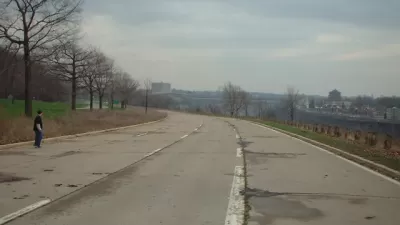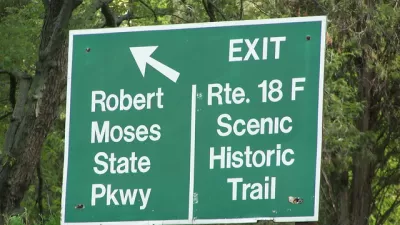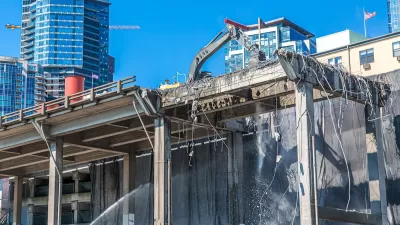From Niagara Falls comes news that the State of New York will rip out a two-mile stretch of the Robert Moses Parkway, which has divided city residents from the scenic Niagara Gorge for a half-century.

"Giving in to decades of local pleas to remove the Robert Moses Parkway, State Parks officials on Wednesday pledged to remove the highway from downtown Niagara Falls to its northern neighborhoods, and possibly farther," reports Charlie Specht. "The highway, which stretches along the city’s waterfront, was built by Moses, the state’s 'master builder,' in the 1960s as a supplement to the Niagara Power Project. The road provided unparalleled views of the Niagara Gorge to motorists but cut off generations of city residents from the waterfront and diverted traffic outside of the central business districts of Niagara Falls."
"The move would connect city streets – currently walled off by fences and guardrails – to the breathtaking but largely untapped asset that is the gorge, raising property values and potentially saving neighborhoods that are slipping into decay," writes Specht. "In its place will be native plantings and a multi-use nature trail that could feature hiking, biking, cross-country skiing, horseback riding and even zip-lining, all of which will be accessible from city streets for the first time in more than 50 years.
Mayor Paul Dyster said, “I don’t think there’s anything that could be more impactful to the revitalization of downtown and the city’s North End business district than dealing with the Robert Moses Parkway. We’ve been dealing with this for some time, and we’re anxious to see some action.”
FULL STORY: State will rip out Robert Moses Parkway in Niagara Falls

Alabama: Trump Terminates Settlements for Black Communities Harmed By Raw Sewage
Trump deemed the landmark civil rights agreement “illegal DEI and environmental justice policy.”

Planetizen Federal Action Tracker
A weekly monitor of how Trump’s orders and actions are impacting planners and planning in America.

Why Should We Subsidize Public Transportation?
Many public transit agencies face financial stress due to rising costs, declining fare revenue, and declining subsidies. Transit advocates must provide a strong business case for increasing public transit funding.

Understanding Road Diets
An explainer from Momentum highlights the advantages of reducing vehicle lanes in favor of more bike, transit, and pedestrian infrastructure.

New California Law Regulates Warehouse Pollution
A new law tightens building and emissions regulations for large distribution warehouses to mitigate air pollution and traffic in surrounding communities.

Phoenix Announces Opening Date for Light Rail Extension
The South Central extension will connect South Phoenix to downtown and other major hubs starting on June 7.
Urban Design for Planners 1: Software Tools
This six-course series explores essential urban design concepts using open source software and equips planners with the tools they need to participate fully in the urban design process.
Planning for Universal Design
Learn the tools for implementing Universal Design in planning regulations.
Caltrans
Smith Gee Studio
Institute for Housing and Urban Development Studies (IHS)
City of Grandview
Harvard GSD Executive Education
Toledo-Lucas County Plan Commissions
Salt Lake City
NYU Wagner Graduate School of Public Service





























